Key takeaways:
- Abuse and trauma often manifest subtly, making it essential to recognize emotional and physical warning signs for effective healing and prevention.
- Changes in behavior and mood, as well as physical signs like unexplained bruises or weight loss, can indicate underlying emotional distress.
- Responding to warning signs with empathy, active listening, and patience encourages open communication and trust.
- Seeking support from groups or helplines can be a vital first step in addressing trauma, emphasizing that asking for help is a strength.

Understanding Abuse and Trauma
Abuse and trauma are often intertwined, creating a complex web of emotional and physical scars. I remember a close friend sharing how she felt trapped in a cycle of fear and guilt during her relationship. It made me wonder: how often do we overlook the subtle signs of emotional abuse, thinking they are just quirks of our partner’s personality?
Trauma can manifest in various ways, from anxiety and depression to physical symptoms we might not immediately associate with our experiences. I once encountered a survivor who described how her anxiety would spike at the sound of certain words, bringing back painful memories. It’s a stark reminder that trauma doesn’t just fade away; it lingers, often surfacing in unexpected moments.
Understanding the nuances of abuse is essential for both healing and prevention. Have you ever felt that gnawing doubt or confusion after a heated argument? In those moments, it’s crucial to recognize that such feelings might hint at deeper issues—issues that deserve to be addressed with compassion and care. Our emotional responses are valid, and acknowledging them is the first step toward reclaiming our narrative.
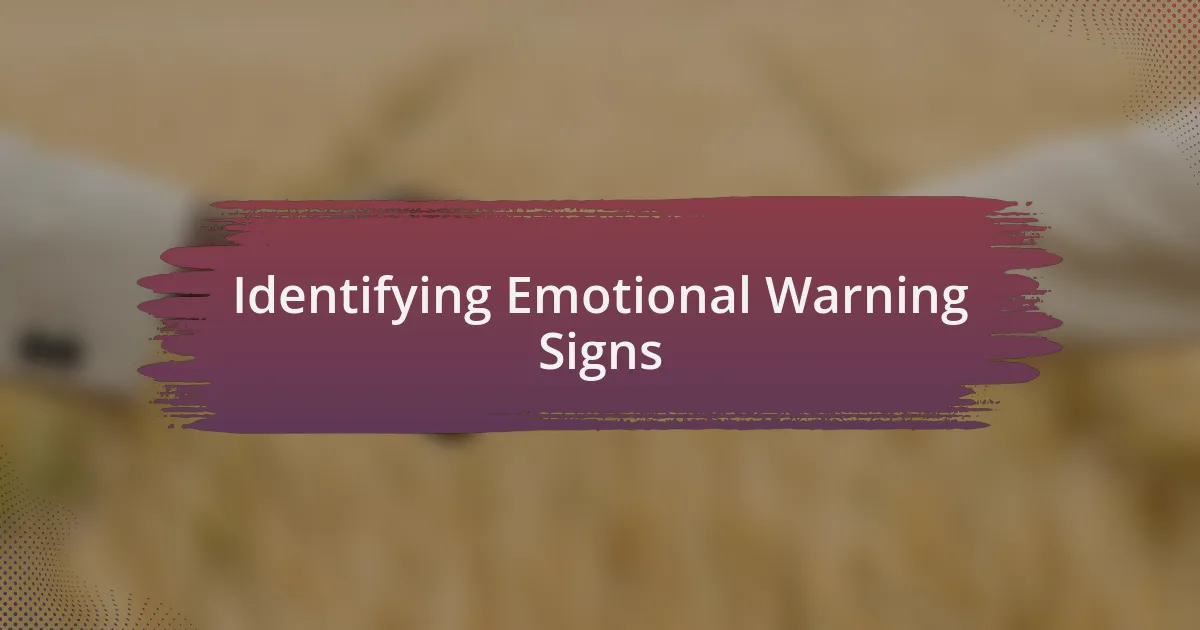
Identifying Emotional Warning Signs
When it comes to spotting emotional warning signs, I often think about changes in mood or behavior that might indicate something deeper is at play. A friend of mine began isolating herself and expressing feelings of worthlessness after a toxic relationship. Noticing these shifts is essential because they often signal underlying emotional distress that shouldn’t be overlooked.
I’ve also experienced the confusion that arises from mixed signals in a relationship. I can remember feeling on edge, unsure if I was overreacting or if my instincts were trying to protect me. It’s interesting how our emotions can act like a compass; they help guide us toward what feels right or wrong. Have you ever felt a wave of sadness or irritation in situations where you should be happy? Those feelings can be a sign that something isn’t right, and it’s worth digging deeper to uncover the sources.
Sometimes the signs are subtle, such as a persistent feeling of anxiety or dread. I recall a period when I constantly worried about disappointing others, even in small matters. This overwhelming sense of responsibility often masked the emotional turmoil I had buried. It’s crucial to listen to those inner voices, as they might be the first hints of unresolved issues that need to be explored and validated.
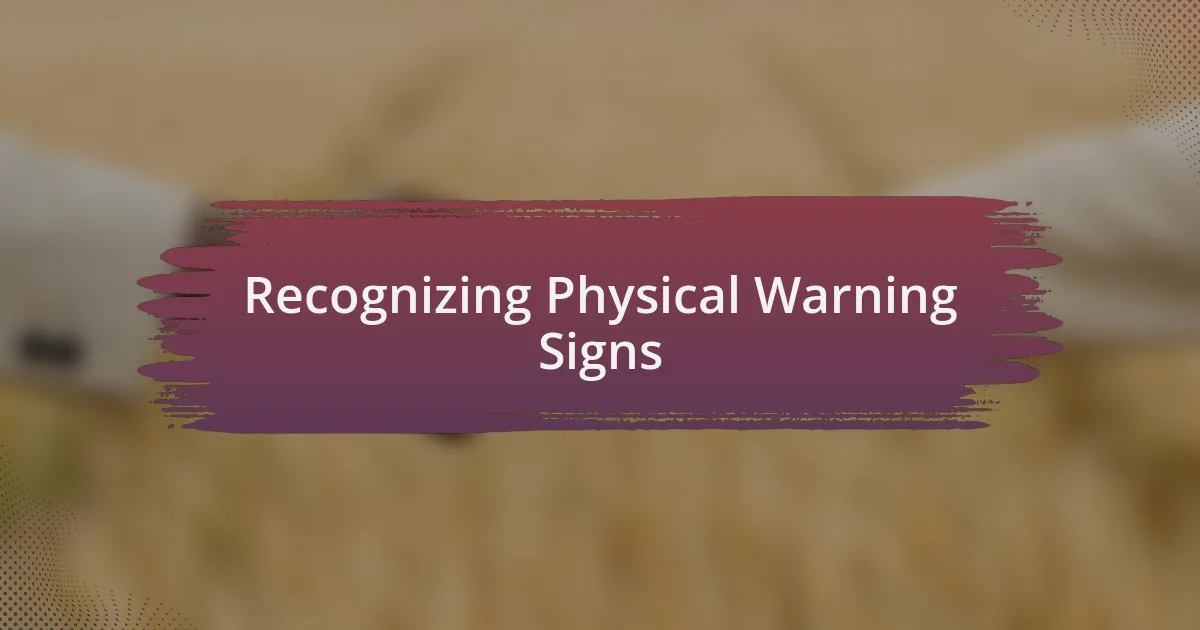
Recognizing Physical Warning Signs
Recognizing physical warning signs can be a crucial step in understanding the dynamics of an abusive situation. I remember noticing unexplained bruises on a friend’s arm, which she dismissed as minor accidents. It struck me that these could be signs of something much more troubling, emphasizing the importance of not taking visible injuries lightly.
Another aspect I’ve come to recognize is changes in body language. I think back to a colleague who became increasingly withdrawn, avoiding eye contact and adopting a defensive posture. It was as if her body was telling a story that her words weren’t revealing. Have you ever observed someone who seemed to shrink in their chair or kept their arms crossed tightly? Those physical manifestations are often a reflection of deeper psychological distress and should prompt a closer look.
Sometimes, physical signs go beyond the obvious to include changes in habits, like sudden weight loss or unhealthy appearance. I recall a time when a family member stopped caring about their grooming or appearance after a difficult relationship. This transformation often indicates a loss of self-worth and can signal a deeper issue that needs addressing. Physical warning signs, while tangible, can reveal unseen emotional battles, making it essential to stay alert and compassionate.
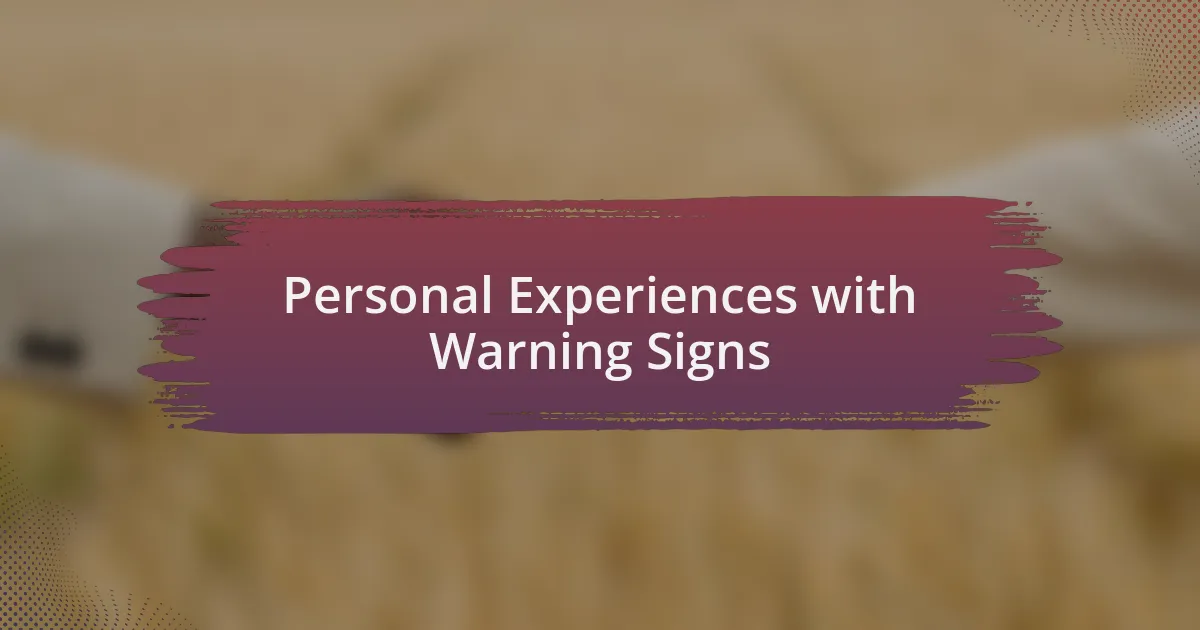
Personal Experiences with Warning Signs
I’ve had moments where subtle changes in behavior really stood out to me. I remember a friend who used to be outgoing suddenly becoming quiet and hesitant. It struck me one day when she flinched at gentle teasing—a stark contrast to her usual laughter. Have you ever seen someone you care about retreating into themselves? It’s a confusing mix of concern and helplessness, as you try to understand what could lead to such a dramatic shift.
Another experience that stays with me was watching a loved one overly apologize for small mistakes, as if constantly walking on eggshells. I sensed an emotional weight behind those words, like she was conditioned to expect criticism. This reaction made me realize how frequent exposure to emotional abuse can manifest in a need for appeasement. Have you experienced the gut feeling that something is seriously off? Trusting those instincts is vital in recognizing the signs that something deeper is troubling someone you care about.
I also reflect on the time when a co-worker stopped sharing about their weekends. It initially seemed like harmless introversion, but when I spoke to them, I noticed a heaviness in their voice that hinted at something more. It made me ponder how we often overlook the quiet signs—those casual remarks that seem benign but reveal layers of distress. Have you ever felt that something unsaid was hanging in the air? Paying attention to these nuances can lead to vital conversations and potentially help someone in need.
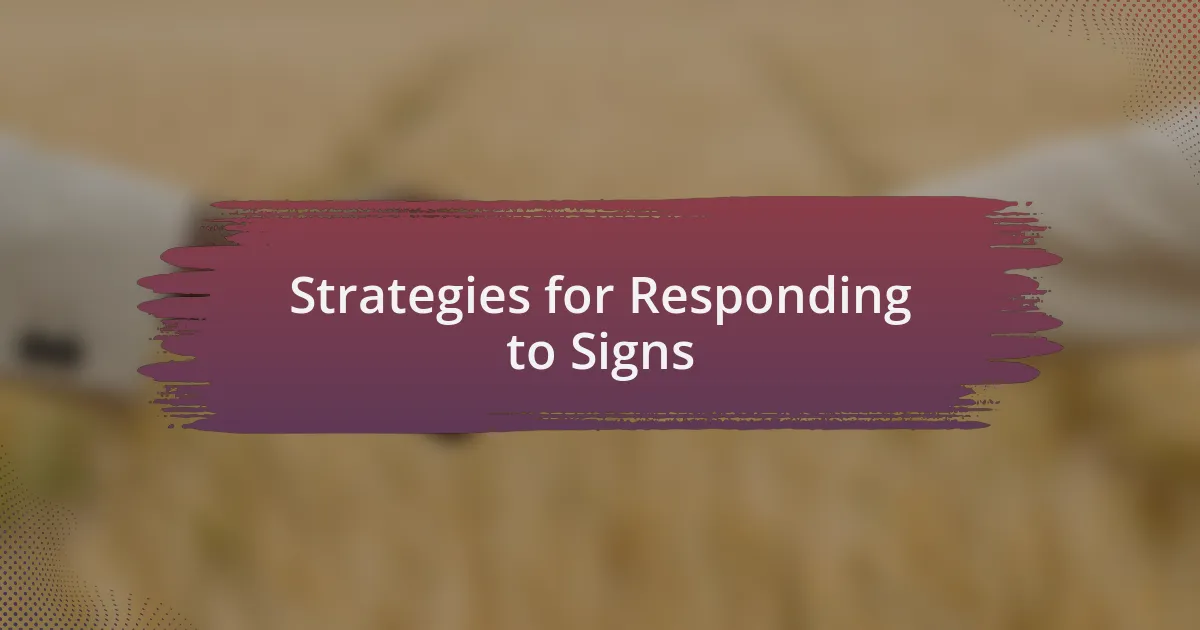
Strategies for Responding to Signs
It’s crucial to approach the warning signs with empathy and openness. I once noticed a neighbor who used to greet me with enthusiasm suddenly avoiding eye contact and hurriedly walking past. Instead of ignoring it, I decided to reach out and check in. When I gently asked if everything was okay, she opened up about feeling overwhelmed and isolated. In my experience, creating a safe space for someone to share can be the first step in addressing the underlying issues.
When responding to warning signs, it’s important to listen more than you speak. I recall a time when a family member seemed unusually distant; asking directing questions didn’t help much. So, I pivoted to simply offering my presence and allowing silence to fill the gaps. Sometimes, just sitting beside someone, letting them know I’m there without pressure to talk, made all the difference. Have you ever found that the most significant breakthroughs happen in moments of quiet reflection?
In addition to attentive listening, being patient is essential. I remember a friend who wasn’t ready to talk about her struggles, but I made it clear that I was there to support her whenever she felt comfortable sharing. That commitment to being present without urgency cultivated trust over time. Do you think we often underestimate the power of patience in our relationships? I’ve learned that consistent, caring support can encourage others to share their hidden battles in their own time, leading to healing and understanding.
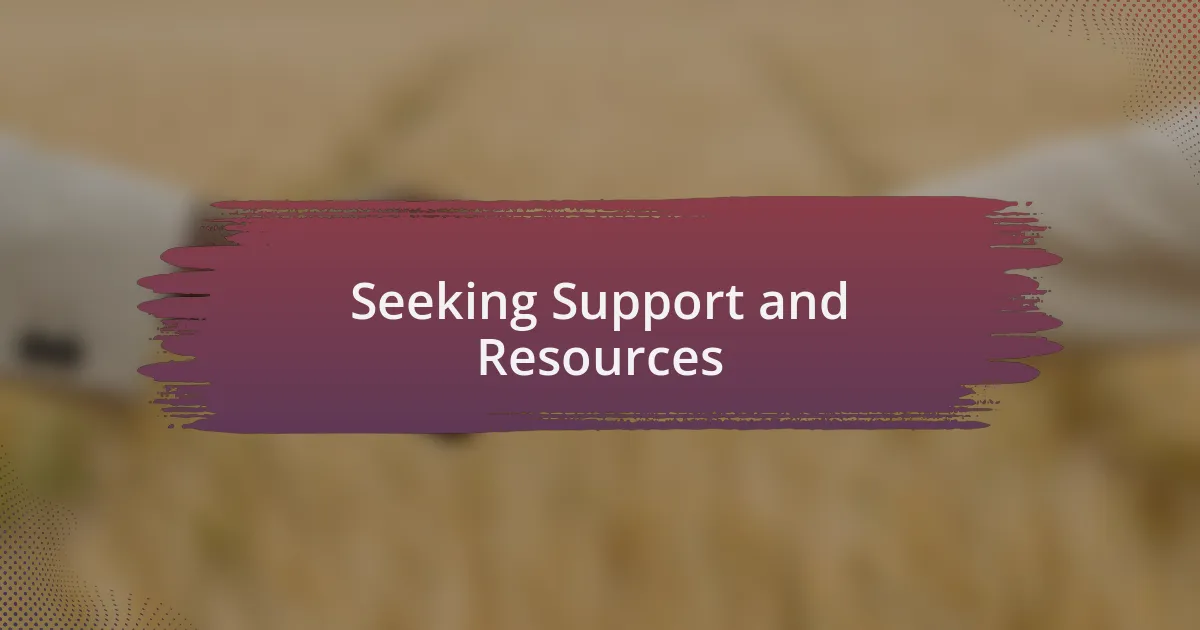
Seeking Support and Resources
Seeking help is often the first step towards healing, but it can feel daunting. I remember when I first sought support after recognizing the warning signs in my own life; feeling vulnerable was overwhelming. I decided to reach out to a local support group, and I was astonished by the warmth of the community. They welcomed me with open arms and reminded me that seeking help is a sign of strength, not weakness. Have you ever found that sharing your struggles with others can lighten the emotional load?
Finding the right resources is equally important. One time, I stumbled upon a helpline that specialized in abuse trauma, and it changed everything for me. Speaking to someone who understood my experiences helped me sort through my thoughts and emotions. They provided not just a listening ear, but also valuable coping techniques. Have you had moments where you discovered a resource that completely shifted your perspective?
In my experience, it’s essential to explore various options for support. Whether it’s professional therapy, online communities, or trusted friends and family, each resource comes with its own benefits. I once explored an online forum and, surprisingly, found powerful stories that resonated deeply with my own. It was comforting to see I wasn’t alone. How about you—what resources have you found that have helped you feel less isolated in your journey?